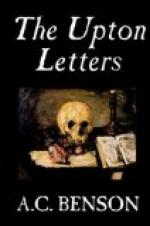I find it very hard to make up my mind; it is true that the fabric of the world would fall to pieces if we were all FitzGeralds. But so, too, as has often been pointed out, would it fall to pieces if we all lived literally on the lines of the Sermon on the Mount. Activities are for many people a purely selfish thing, to fill the time because they are otherwise bored; and it is hard to see why a man who can fill his life with less strenuous pleasures, books, music, strolling, talking, should not be allowed to do so.
Solve me the riddle, if you can! The simplicity of the Gospel seems to me to be inconsistent with the Expansion of England; and I dare not say off-hand that the latter is the finer ideal.—Ever yours,
T. B.
Upton,
May 15, 1904.
My dear Herbert,—You ask if I have read anything lately? Well, I have been reading Stalky & Co. with pain, and, I hope, profit. It is an amazing book; the cleverness, the freshness, the incredible originality of it all; the careless ease with which scene after scene is touched off and a picture brought before one at a glance, simply astounds me, and leaves me gasping. But I don’t want now to discourse about the literary merits of the book, great as they are. I want to relieve my mind of the thoughts that disquiet me. I think, to start with, it is not a fair picture of school life at all. If it is really reminiscent—and the life-likeness and verisimilitude of the book is undeniable—the school must have been a very peculiar one. In the first place, the interest is concentrated upon a group of very unusual boys. The Firm of Stalky is, I humbly thank God, a combination of boys of a rare species. The other figures of boys in the book form a mere background, and the deeds of the central heroes are depicted like the deeds of the warriors of the Iliad. They dart about, slashing and hewing, while the rank and file run hither and thither like sheep, their only use being in the numerical tale of heads that they can afford to the flashing blades of the protagonists; and even so the chief figures, realistic though they are, remind me not so much of spirited pictures as of Gillray’s caricatures. They are highly coloured, fantastic, horribly human and yet, somehow, grotesque. Everything is elongated, widened, magnified, exaggerated. The difficulty is, to my mind, to imagine boys so lawless, so unbridled, so fond at intervals of low delights, who are yet so obviously wholesome-minded and manly. I can only humbly say that it is my belief, confirmed by experience, that boys of so unconventional and daring a type would not be content without dipping into darker pleasures. But Kipling is a great magician, and, in reading the book, one can thankfully believe that in this case it was not so; just as one can also believe that, in this particular case, the boys were as mature and shrewd, and of as complete




